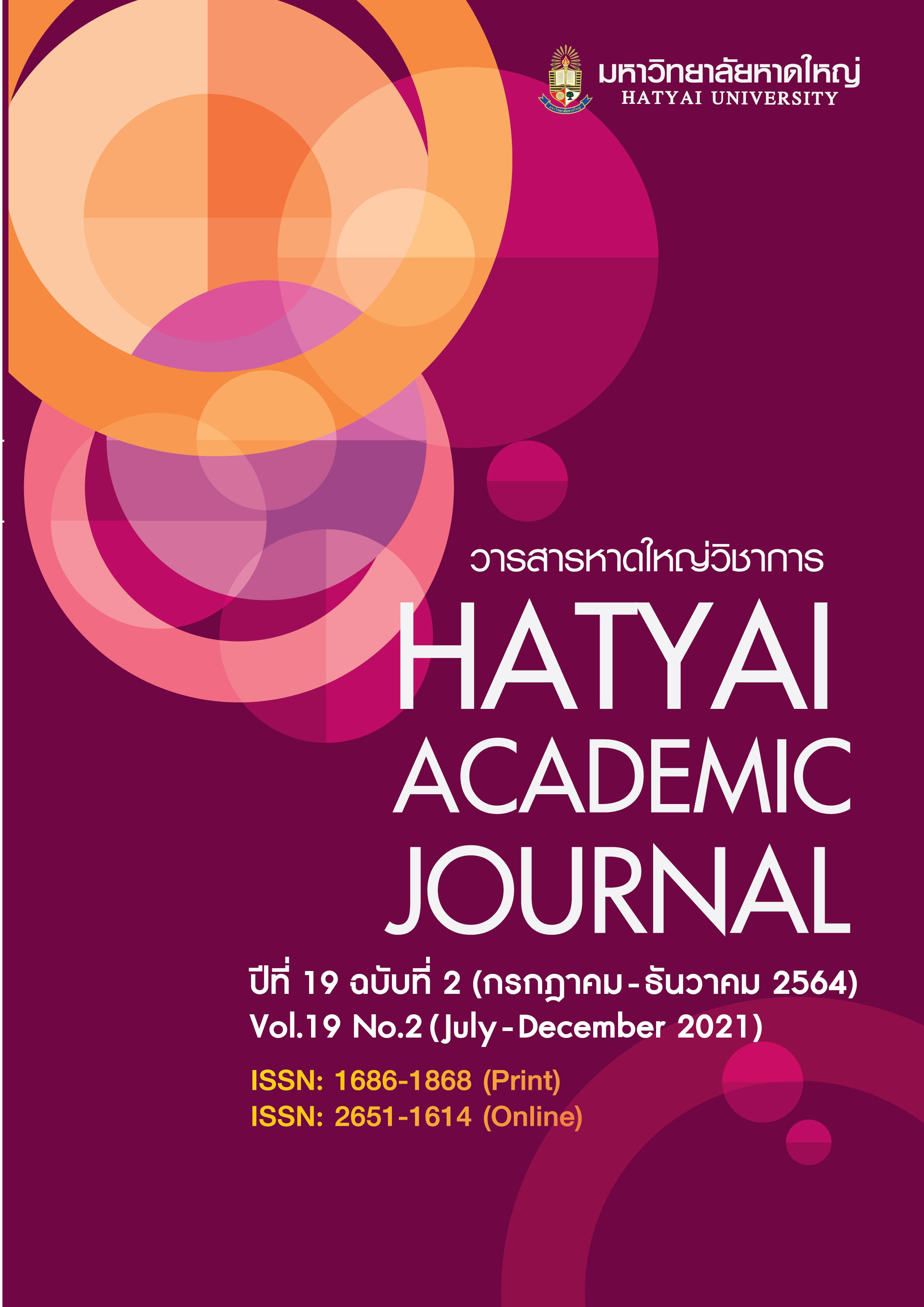Food Waste Management in a Hotel Kitchen for Effective Handling of the Raw Materials and Being more Environmentally Friendly
Main Article Content
Abstract
The growth of the tourism and hotel industry has increased the amount of food waste in a hotel kitchen for decades. Food waste is indeed a management challenge. Operators in this business, operating in an unbalanced way, suffer losses caused by five main factors: (1) inefficiency of production flow, (2) inadequate skills of the personnel, (3) inappropriate business policy of the restaurant, (4) poor planning and design of food item, and (5) inefficiency in the delivery of goods and services. In addition, to actualize eco-friendly kitchen management, business operators need to understand the economy, which focuses on sustainability and community collaboration as its conceptual basis. This economy should also emphasize eco-friendly management with knowledge development and sharing, collaborative integration of food waste management into practices using technology, clear communication for collaborative planning, and solving problems of the entire organization and the problems in each department with knowledge and competence. Taking action by great care or working towards the same goal will eventually motivate the stakeholders to consider using more eco-friendly products for the community and bring more efficiency in managing the hotel’s kitchen system. To manage the kitchen system to be environmentally friendly, reducing food waste, attaining Thailand’s economic development plan, moving Thai society into a new mode of development, and sustainability, kitchen operators should implement the 13 strategies which help innovate and bring a new approach of managing food waste in the kitchens of the hotel businesses.
Article Details
All published articles are evaluated by three qualified peer reviewers from various institutions through a double-blind process, where reviewers do not know the authors’ identities and authors do not know the reviewers’ identities. The content and articles in the Hatyai Academic Journal reflect the authors’ views only and are neither the opinions of the editorial board nor the responsibility of Hatyai University. The Editorial Board of the Hatyai Academic Journal allows articles to be reproduced for academic purposes, on the condition that the original source is clearly cited.
References
Anakamanee, K. (2018). 5 Food waste in kitchen. Retrieved from https://www.ftpi.or.th/ 2018/24674 [in Thai]
Baldwin, C. J., & Shakman, A. (2012). Food waste management. In A. Shakman & J. Turenne (Eds.), Greening food and beverage services: A green seal guide to transforming the industry (pp.57-58). Washington, DC: Green Seal.
Ball, S., & Taleb, A. M. (2011). Benchmarking waste disposal in the Egyptian hotel industry.Tourism and Hospitality Research, 11(1), 1-18.
Beretta, C., & Hellweg, S. (2019). Potential environmental benefits from food waste prevention in the food service sector. Resources, Conservation and Recycling, 147, 169-178.
Donavanik, S. (2018). Cool idea penetrating the trend of modern hotels, the descendant of dusit group. Retrieved from https://www.thairath.co.th/lifestyle/woman/hisoceleb/1211847 [in Thai]
Evans, D. (2012). Beyond the throwaway society: Ordinary domestic practice and a sociological approach to household food waste. Sociology, 46(1), 41-56.
FAO. (2017). Food loss and food waste. Retrieves from www.fao.org/food-loss-and-food-waste/en/
Filimonau, V., & Delysia, A. (2019). Food waste management in hospitality operations: A critical review. Tourism Management, 71, 234-245.
Food Science and Technology Association of Thailand. (2017). Food loss and food waste. Retrieved from https://www.fostat.org/de2/ [in Thai]
FoodStory. (2019). The 7 wastes in restaurant business. Retrieved from https://www. foodstory.co/blog/the-7-wastes-in-restaurant-business [in Thai]
Goh, C. (2019). Sustain hotel. Retrieves from https://sdthailand.com/2019/02/sustain-hotel/
Gustavsson, J., Cederberg, C., Sonesson, U., Otterdijk, R. V., & Meybeck, A. (2011). Global food losses and food waste: Extent, causes and prevention. Retrieved from http://www.fao.org/3/a-i2697e.pdf
Holly, T. (2014). Reducing and managing food waste in hotels. Retrieves from https://www.greenhotelier.org/know-how-guides/reducing-and-managing-food-waste-in-hotels/
Hongwiwat, T. (2018). Edible food can it really be resolved. Retrieved from https://krua.co/food-story/food-feeds/59/Edible food Can it really be resolved?
Light Blue Environmental Consulting. (2019). Business case study: Food waste prevention. Retrieves from https://www.lightblueconsulting.com/
Massow, M. V., & McAdams, B. (2015). Table scraps: An evaluation of plate waste in restaurants. Journal of Foodservice Business Research, 18, 437-453.
Methanuphap, C. (2019). Luxury trends are left out when fine dining restaurants create menus using waste materials. Retrieved from https://www.greenery.org/ articles/trend-zerowastefinedining/ [in Thai]
National Geographic. (2019). Junk food a big problem that is overlooked. Retrieved from https://ngthai.com/environment/17253/food-waste-crisis/ [in Thai]
National Science and Technology Development Agency. (2018). BCG economy model. Retrieved from https://www.nstda.or.th/th/nstda-strategy-plan/nstda2/12785-bcg-economy [in Thai]
Navarat, A. (2018). Sampran Riverside’ model to manage food waste, hotel business. Retrieved from https://www.thaipost.net/main/detail/1117 [in Thai]
Nguyen, L. (2018). Food waste management in the hospitality industry: Case study: Clarion hotel Helsinki (Bachelor’s thesis). University of Applied Sciences, Helsinki, Finland.
Pimmarat, P. (2018). Food waste reduction idea from the movie wasted which is both worth seeing and tasty. Retrieved from https://www.greenery.org/articles/wastesidestory-wastedmovie/ [in Thai]
Pirani, S. I., & Arafat, H. A. (2014). Solid waste management in the hospitality industry: A review. Journal of Environmental Management, 146, 320-336.
Pirani, S. I., & Arafat, H. A. (2016). Reduction of food waste generation in the hospitality industry. Journal of Cleaner Production, 132, 129-145.
Saowapruek, Y. (2018). Break through the food waste crisis. Retrieved from https://www.prachachat.net/economy/news-215781 [in Thai]
SCB SME. (2018). Idea to manage food waste in a good environment. Retrieved from https://businesslinx.globallinker.com/bizforum/article/Idea to manage food waste in a good environment/13629#/overlay/signup/articleview/13629 [in Thai]
Srijuntrapun, P. (2016). Integrated food waste reduction in households. Silpakorn University Journal, 36(3), 19-36. [in Thai]
Thailand Development Research Institute-TDRI. (2019). Study of guidelines for managing excess food to reduce food waste problems that are appropriate for Thailand. Retrieved from https://tdri.or.th/wpcontent/uploads/2019/09/final_food_waste_ management.pdf [in Thai]
Thyberg, K. L., & Tonjes, D. J. (2016). Drivers of food waste and their implications for sustainable policy development. Resources, Conservation and Recycling, 106, 110-123.
Wibunthanakun, S. (2019). The world has left a lot of good food. Retrieved from https://www.bangkokbiznews.com /blog/detail/648819 [in Thai]
WRAP (2013). Overview of waste in the UK hospitality and food service sector. Retrieved from https://www.wrap.org.uk/content/overview-waste-hospitality-and-food-service-sector


